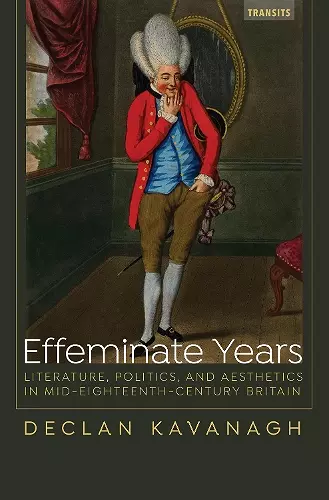Effeminate Years
Literature, Politics, and Aesthetics in Mid-Eighteenth-Century Britain
Format:Hardback
Publisher:Associated University Presses
Published:23rd Jun '17
Currently unavailable, our supplier has not provided us a restock date
This hardback is available in another edition too:
- Paperback£39.99(9781611488265)

Effeminate Years: Literature, Politics, and Aesthetics in Mid-Eighteenth-Century Britain investigates the gendered, eroticized, and xenophobic ways in which the controversies in the 1760s surrounding the political figure John Wilkes (1725-97) legitimated some men as political subjects, while forcefully excluding others on the basis of their perceived effeminacy or foreignness. However, this book is not a literary analysis of the Wilkes affair in the 1760s, nor is it a linear account of Wilkes’s political career. Instead, Effeminate Years examines the cultural crisis of effeminacy that made Wilkes’s politicking so appealing. The central theoretical problem that this study addresses is the argument about what is and is not political: where does individual autonomy begin and end? Addressing this question, Kavanagh traces the shaping influence of the discourse of effeminacy in the literature that was generated by Wilkes’s legal and sexual scandals, while, at the same time, he also reads Wilkes’s spectacular drumming up of support as a timely exploitation of the broader cultural crisis of effeminacy during the mid century in Britain.
The book begins with the scandals and agitations surrounding Wilkes, and ends with readings of Edmund Burke’s (1729-1797) earliest political writings, which envisage political community—a vision, that Kavanagh argues, is influenced by Wilkes and the effeminate years of the 1760s. Throughout, Kavanagh shows how interlocutors in the political and cultural debates of the mid-eighteenth-century period in Britain, such as Tobias Smollett (1721-1771) and Arthur Murphy (1727-1805), attempt to resolve the problem of effeminate excess. In part, the resolution for Wilkes and Charles Churchill (1731-1764) was to shunt effeminacy onto the sexually non-normative. On the other hand, Burke, in his aesthetic theorization of the beautiful privileges the socially constitutive affects of feeling effeminate. Through an analysis of poetry, fiction, social and economic pamphlets, aesthetic treatises, journalism and correspondences, placed within the latest queer historiography, Kavanagh demonstrates that the mid-century effeminacy crisis served to re-conceive male heterosexuality as the very mark of political legitimacy. Overall, Effeminate Years explores the development of modern ideas of masculinity and the political subject, which are still the basis of debate and argument in our own time.
Kavanagh (Univ. of Kent, UK) presents an investigation into the twilight world of gender/sex-fluid men—referred to as, among other monikers, sodomites, catamites, and mollies—during Britain’s Georgian period. Kavanagh's critical examination of the works of Charles Churchill, Edmund Burke, John Wilkes, and others illuminates the role effeminacy played in shaping discourse of the day. Kavanagh’s embedded thesis is that fluid identity and outré sexual practices of this period challenged the era’s sensibilities and set the precedent for current efforts to broaden gender and sexual categorizations. In this regard, Kavanagh’s book complements extant research on the subject. Kavanagh’s obvious authority on the subject matter qualifies him for inclusion among the field’s most credible scholars.... [T]he book’s value to English history, literary studies, and gender and sexuality studies stands unquestioned. Summing Up: Essential. Researchers and faculty. * Choice Reviews *
Effeminate Years is a wonderful book. Beautifully written and engaging throughout, at times its wittiness is absolutely dazzling; but still the argument is rigorous and really compelling throughout. This is a book for anyone interested in gender and sexuality in the eighteenth century or in queer studies more generally. In an age of ever-richer political satire, moreover, this book offers a special treat for readers.? -- George Haggerty
Effeminate Years explores how ideal versions of masculinity become imbricated in idealised versions of nationality and ethnicity. Specifically, this book reveals how discourses of effeminacy and idealised masculinity structure the formation of English, Irish and Scots ethnic identities in the years when the project of the British Empire was emerging from infancy. The mid’ years of the Eighteenth Century saw the final defeat of Gaelic Jacobite hopes and the consolidation of an ascendant English Protestant nationalism which segued into British colonialism. Effeminate Years provides a remarkably comprehensive, deft and very entertaining account of the culture wars of these important years to demonstrate how the cultural productions of the era manifest anxiety, opportunism and counter-strategy about what kind of man should and would lead the development of Britain and expansion of empire. -- Katherine O'Donnell, University College Dublin
ISBN: 9781611488241
Dimensions: 237mm x 158mm x 26mm
Weight: 572g
268 pages